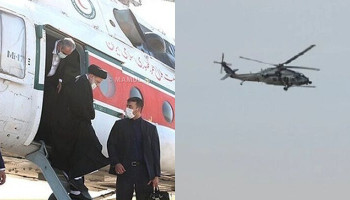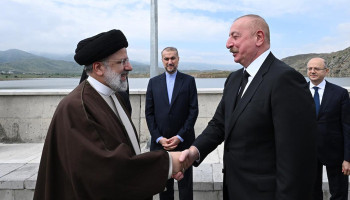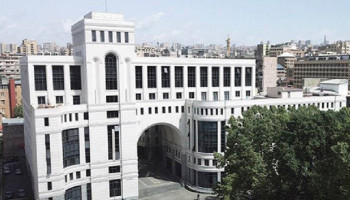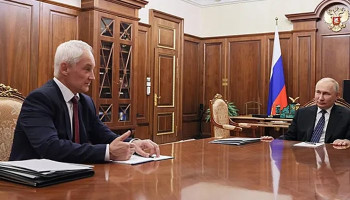How Much More Economic Pain Can Vladimir Putin Take?
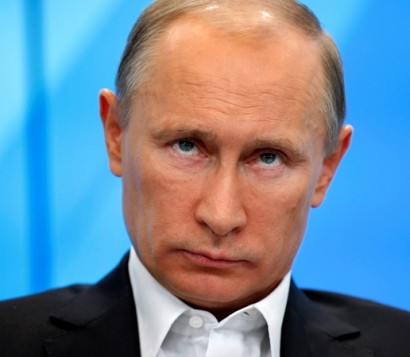 It’s been a little more than six months since the full brunt of Western sanctions took force against Russia. The punishment, while slow in coming, has proven devastatingly effective—especially when paired with the crash in oil prices. Last summer, of course, U.S. and European Union officials had no way of knowing an epic oil selloff was right around the corner. But in hindsight the coordination seems uncanny. Oil prices peaked less than a month before the sanctions were announced. By November, the combination of cheap oil and tighter sanctions was bleeding Russia of billions in budget revenue and had cut it off from the world’s largest capital markets. In December, state-owned oil giant Rosneft had to get a loan backed by the Central Bank of Russia, which is sort of like the U.S. Fed giving a loan to ExxonMobil. Recent news reports suggest Russian President Vladimir Putin is doing a better job of hurting the Ukrainian economy than the West is doing of bolstering it—but at what cost? The chaos Putin has sown in Ukraine has extracted a huge toll on his own economy. Together, sanctions and cheap oil have given Russia the deadly combination of a crashing currency and a sinking economy. To manage, Russia’s central bank has tacked between propping up the ruble with higher interest rates, and trying to goose economic growth by lowering them a month later. Neither strategy has worked. The ruble is at near-historic lows against the dollar, and Russia’s economy is in free fall. Remember those stories last December of Russians stocking up on big-ticket items in anticipation of rampant inflation? Those anxious shoppers were right. On top of that, Russian retail sales are falling for the first time since the financial crisis, and real wages are declining faster than they have since Putin came to power in 1999. Russia is clearly heading for a recession. The question is how bad it gets. Most banks are forecasting that Russian gross domestic product will shrink by just a few percentage points this year. The World Bank, for instance, estimates Russia’s economy will contract by just 1.5 percent in 2015. But that assumes an average oil price of $70 a barrel—$10 higher than the current price for international crude. Yes, those grim forecasts were made two months ago. But with crude production still booming in the U.S. and demand sluggish around the world, it seems like cheap oil is here to stay for the foreseeable future. That’s why some analysts are starting to think Russia could be on the brink of a much bigger economic disaster. Anders Aslund, a senior fellow at the Peterson Institute for International Economics, believes Russia’s economy could contract by 10 percent in 2015. That would mark the worst annual decline since the country defaulted on its debt in 1998. And for what? The right to annex a war-torn industrial region of eastern Ukraine? To the West, it seems an incredibly foolish gambit by Putin. But if there’s one thing this crisis has proven, it’s that projecting Western values and rationale onto the Kremlin’s decision-making is futile. Over the bulk of his time in power, Putin has delivered an unprecedented amount of economic growth and stability to his country. Since 1999, Russia’s poverty rate has fallen from more than 25 percent of the population to about 11 percent, while GDP per capita has more than doubled. Compare that with the economic and political chaos of the 1990s, and it’s not hard to understand why Putin remains so popular in Russia. Putin seems to be betting 15 years of prosperity has bought him enough credibility that the nation will back his continued incursions into Ukraine. And to the degree that some Russians have objected, his increased crackdowns on protesters and independent press should do the trick. At least for a while. It's too early to tell what effect the murder of opposition leader Boris Nemtsov will have on Putin's sway over the country. Nemtsov was one of Putin's harshest critics and was reportedly gathering evidence of Russia's direct involvement in the conflict over Ukraine. What had been planned as an opposition rally organized by Nemtsov turned into apeaceful march to mourn him on Sunday. The true test of Putin’s hold on power will come as everyday Russians are forced to give up the kind of lifestyle they’ve become accustomed to over the past 15 years. It will be interesting to gauge Russians’ tolerance for watching their wages fall and their wealth evaporate in the face of double-digit inflation. In that way, what Putin now sees as a source of his legitimacy—those years of prosperity—could end up being a source of his undoing. Are Russians really willing to impoverish themselves for the sake of grabbing a sliver of eastern Europe? But even if Putin stops sending weapons to Ukrainian rebels and gives Crimea back, and all those financial sanctions go away, he still has to contend with cheap oil, which strikes at the core of Russia’s economy and is ultimately a much bigger problem. Even though Russia remains the world’s largest crude producer, the solution lies more in the hands of frackers in Texas and North Dakota than it does with anyone else at the moment. And as of yet, the frackers haven’t turned off the spigot. |











